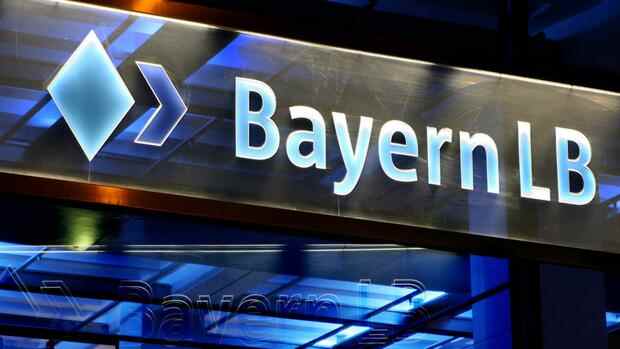Due to the consequences of the Ukraine war and the high inflation, the Münchener Landesbank is currently exchanging information with its corporate customers “more intensively than ever before”.
(Photo: dpa)
Munich BayernLB is facing headwinds in one of its most important business areas. Due to increased interest rates on loans and construction costs, business with the financing of office buildings, residential properties and logistics centers is weakening among Munich residents.
“We sense that customers are more cautious in commercial real estate financing,” BayernLB boss Stephan Winkelmeier told Handelsblatt. “Some investors are leaving the land they have acquired lying idle due to increased financing costs.”
With a commitment of around EUR 70 billion, BayernLB is one of the largest German financiers of commercial real estate – and it has set itself the goal of continuing to grow in this area. In addition to the private customer business of the online subsidiary DKB and the corporate customer business, commercial real estate financing is a central pillar in the business model of the second largest German state bank.
The end of the real estate boom also had an impact on BayernLB elsewhere. Winkelmeier has put plans for the sale of the company headquarters in the center of Munich and the move to a smaller building in the south-west of the city on hold due to the uncertainties on the real estate market.
Top jobs of the day
Find the best jobs now and
be notified by email.
Real estate investors are also cautious because of the war in Ukraine, the ongoing surge in inflation and significantly higher financing costs. In the second quarter of the year, the transaction volume in the German real estate investment market fell by around a third to 11.6 billion euros, according to the latest data from the service provider CBRE.
Peter Axmann, Head of Real Estate Customers at Hamburg Commercial Bank (HCOB), recently told Handelsblatt: “A serious and reliable calculation of project developments is hardly possible anymore, also because increased building material prices can no longer be passed on to customers in the form of higher prices.” Banks are therefore becoming more cautious and reviewing their portfolios.
Corporate customers are “cautious but not desperate”
The same applies to corporate customers, where uncertainty is also high due to the war in Ukraine, high inflation and an impending recession. “We are currently talking to our corporate customers more intensively than ever before,” says BayernLB boss Winkelmeier. The bank discussed with them how supply chain problems and inflation would affect them and how they would react to a possible gas supply freeze.
“Companies are cautious, but not desperate,” reports Winkelmeier. “The vast majority of companies are solidly financed – in the first quarter they issued more bonds than they have in a long time. Their order books are full and there are currently no problems to be identified.”
However, Winkelmeier is also aware that the situation can change abruptly if Russia does not resume gas supplies to Germany after the scheduled end of maintenance on the Nord Stream 1 Baltic Sea pipeline on July 21.
>> Read also: Russia ties gas supply to conditions – Berlin does not want to be “blackmailed” by Putin
“Should there be a gas supply stop, the situation would worsen significantly,” warns the BayernLB boss. The German Institute for Economic Research assumes that domestic industry will shrink by 12 to 14 percent. “That would be a sharper decline than in the financial crisis,” says Winkelmeier.
Such a severe recession would lead to more company bankruptcies and also leave clear traces on the balance sheets of German banks. BayernLB therefore already emphasized in May that its forecast of making a pre-tax profit of EUR 300 to 500 million in the current year is subject to “increased uncertainty”.
More: More than 40 percent market value lost: The German banks are afraid of the future
